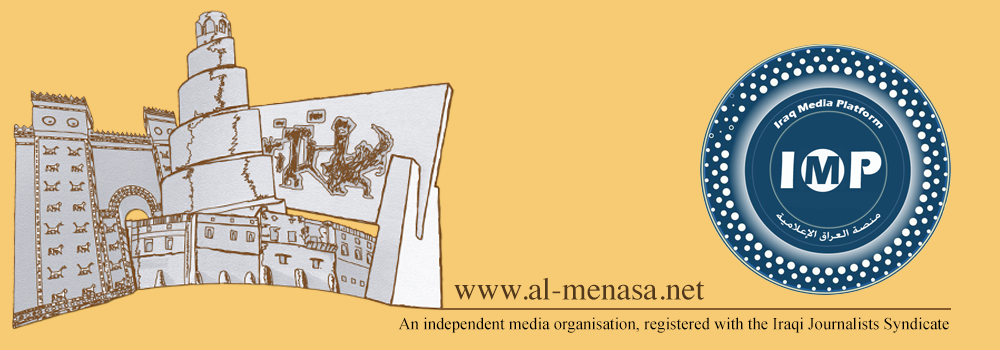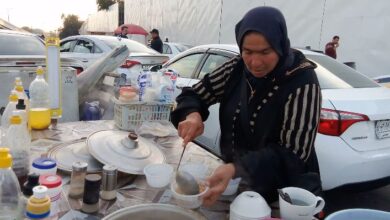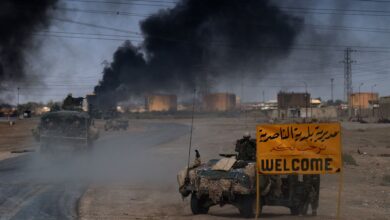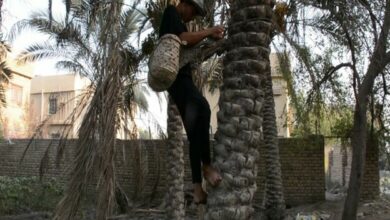GRAND DESIGNS ON HOME DELIVERY: Basra’s improved security makes big business plans possible for local women

By Nagham Makki in Basra
Farahidi Street in central Basra is busy with passers-by and traffic. That doesn’t seem to bother Um Hussein, who has carefully arranged different types of food on her table. Next to her table, other vendors sell books and phone accessories. Across from her, more book kiosks and the Farahidi theatre.
Every Friday, Um Hussein comes here for about six hours, to sell the food she has prepared at home, with help from her family. At her home, a different dish is prepared for the Friday sales every day of the week. She coordinates the dishes carefully in time, for the weekend.
“I was trying to find a job that would cover my family’s expenses and personal needs,” the 40-year-old local says. “So I started in 2008, making tarts, pastries, donuts and all kinds of sweets.”
People liked her food and she found her dishes in demand. She has moved from making food at neighbors’ requests to selling in bazaars, and most recently hawking her snacks in Farahidi Street, which is famous for its booksellers and cultural events.
A customer orders a meal and Um Hussein smiles broadly. She explains that what her customers call her, depends on where she’s working. Here, on Farahidi Street, she is Um Hussein because her son, Hussein, also works here. But at home she is Um Narges, because of her eldest daughter, Narges.
One of her most popular dishes is dolma. It consists of rice seasoned with Iraqi spices, mixed with finely chopped vegetables, especially garlic, onions, tomatoes, and parsley. Minced meat is added, then the mixture is stuffed inside grape or chard leaves. At the bottom of the pot, lemon and water are added.
One customer at Um Hussein’s table can’t seem to make up his mind. So he asks her to prepare a smaller portion of dolma for just IQD1,000 (about US$0.76). Um Hussein adds a little bit of pomegranate syrup to the dish and the customer moves off to the side, grimacing with delight at what he is tasting.
In Iraq, dolma flavors really vary from one part of the country to another. In the northern and central parts of the country, locals like it a little more sour. But in Basra, dolma has a sweeter flavour.
Um Hussein explains that she used to make things out of palm fronds to sell. But since she’s been so successful with her cooking, especially her dolma and the pastries, she has been able to make a good living on Farahidi Street. Her mother helps her prepare the dishes and her children assist in sales and transportation. “My family is my support in every step I take,” she says.
Farahidi Street is about 500 meters long and the sidewalks are crowded with kiosks selling handmade wooden toys, antiques, children’s products and books. The design of the kiosks is supposed to resemble “shanasheel,” the Iraqi name for the balconies that protrude from houses in traditional Islamic architecture. The street itself is a cultural attraction in itself, modeled on Baghdad’s famous Mutanabbi Street, frequented by writers and intellectuals. Often there are special events, concerts or exhibitions, held along Farahidi Street.
Security has improved a lot in Iraq over the past two decades and this has allowed women like Um Hussein to work out in the open without fear, in areas like Farahidi Street. Previously only men worked here. Farahidi Street also draws other female vendors who will start small businesses, doing things like gift wrapping, selling books, presenting Arabic calligraphy or making food, like Um Hussein. The improved security has also helped Basra’s economy. The city, with its ports and oil sector, has often been described as the economic capital of Iraq.
Farahidi Street is not even Um Hussein’s ultimate ambition. What she would really like is to build a larger kitchen into her house and then purchase an oven that allows her to cook larger quantities, as well as a clay oven for grilling fish and baking bread. Then she envisages being able to deliver meals to homes and offices around Basra.
“I want to work with my children on a big project that provides us with a decent livelihood and makes our customers happy,” Um Hussein says. She won’t reveal which name she plans to use though. That is, will it be Um Hussein’s kitchen or Um Narges’ kitchen? Then again, maybe it doesn’t matter. What matters most is that her dream might come true.
This story was produced as part of a series of articles with the support of the Qarib programme, a regional program funded by the French Development Agency (AFD) and implemented by the French Media Development Agency (CFI).




